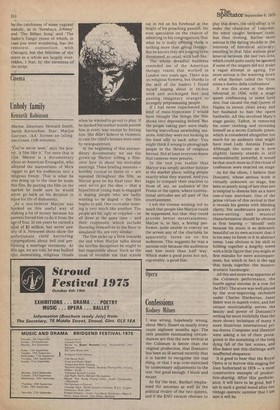Opera
Confessions
Rodney Milnes
I was wrong, hopelessly wrong, . about Mary Stuart on nearly every count eighteen months ago. The only possible extenuating circumstances are that the new revival at the Coliseum is better than the original production, that Donizetti has been so ill-served recently that it is harder to recognise the real thing, or that I was over-exercised by unnecessary adjustments to the text. Not good enough. I blush and recant.
As for the text, Bardari emphasised the amorous as well as the political rivalry of the two queens, and if the ENO version chooses to
play this down, the only effect is to make the character of Leicester, the tenor caught between them, less than riveting. Rather more serious is the dating muddle in the interests of historical accuracy, 'resulting in that fatal sixteen-year interval between the last two acts, which could quite easily be ignored if some of the singers did not make a vague attempt at ageing. Far more serious is the watering down of what Bardari called the 'Gran scena e duetto della confessione'.
It was this scene at the dress rehearsal in 1834, with a stage queen confessiong to some lurid sins, that caused the real Queen of Naples to swoon clean away and her husband to ban the opera forthwith. All this involved Mary's stage gaoler, Talbot, in removing his outer clothing and revealing himself as a secret Catholic priest, which is considered altogether too much for an audience that might have read Lady Antonia Fraser. Although the scene as it now slightly lamely stands is still extraordinarily powerful, it would be that much more so if the ritual of confession were enacted on stage.
As for the idiom, I believe that Donizetti, whose serious work is virtually unknown on stage, has been so poorly sung of late that one is tempted to dismiss him as a mere rum-ti-turn merchant. One of the prime virtues of this revival is that it reveals his genius with blinding clarity. His unobtrusive powers of scene-setting and musical characterisation should be obvious at first hearing — 'should' only because his music is so delicately beautiful on its own account that it is too easy to listen to it in abstract terms. Less obvious is his skill in. holding together a lengthy scena with a little figure that you might at first mistake for mere accompaniment, but which in fact is the egg that binds together the musicodramatic hamburger.
All this and more was apparent at the Coliseum performance, the fourth signal success in a row for the ENO. The score was well played by the ever-improving orchestra under Charles Mackerras. Janet Baker was in superb voice, and her unique musicianship serves the beauty and power of Donizetti's writing far more truthfully than the more showy technique of many a more illustrious international prima donna. Composer and librettist were asking a lot of their protagonist in the sustaining of the long dying fall of the last scenes, and Miss Baker met this challenge with unaffected eloquence.
It is good to hear that the Royal Opera is to borrow this staging for Joan Sutherland in 1978 — a most constructive example of production-sharing. After this performance, it will have to be good, but I am in such a genial mood after our vintage operatic summer that I am sure it will be


































 Previous page
Previous page